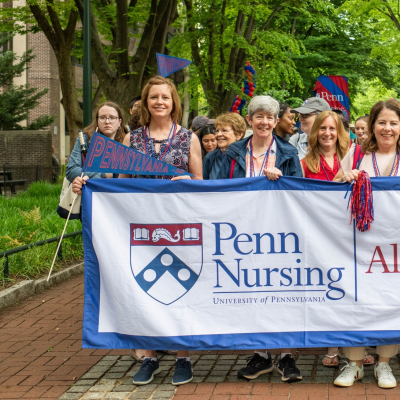
Julie Sochalski, PhD, RN, FAAN
Associate Professor of Nursing
Associate Dean for Academic Programs
Class of 1965 25th Reunion Term Chair
- Department of Biobehavioral Health Sciences
- Doctor of Nursing Practice in Executive Leadership
- Post-Master’s Doctor of Nursing Practice
Telephone: (215) 898-3147
Email: julieas@nursing.upenn.edu
As the United States’ former chief nurse, Julie Sochalski has one patient: the U.S. health care system. Her intervention is evidence-based reform to heal that system. From 2010-2013, Dr. Sochalski directed the U.S. Department of Health & Human Services Division of Nursing and was its principal advisor for health workforce policy, overseeing a $250 million budget.
An investigator in health systems analysis and health policy, Dr. Sochalski studies gaps in the U.S. health care system and how policy solutions are devised and implemented to fill them. She also studies the impact – intended and unintended – of health policy decisions. She is particularly interested in how nurses and other health care professionals are best deployed to achieve optimal population health.
Education
- PhD, University of Michigan, 1988
- MS, University of Michigan, 1979
- BS, University of Michigan, 1975
Research
A career that encompasses health care ethics, financing, and policy gives Dr. Sochalski a healthy regard for interdisciplinary thinking and curiosity. Her research on the health care workforce, currently funded by the National Council of State Boards of Nursing, includes studying nurse practitioners, home health services, and nurse-led rehabilitation as avenues to maximize health benefits for the greatest number of patients. Dr. Sochalski’s modus operandi is to continually question how diverse providers practice, with which patients and in what settings, to find new solutions for patients who need care.
Clinical Practice
Her Health and Human Services position gave Dr. Sochalski the chance to consider nursing education, practice, and research from a new vantage point. Working with the National Institute of Nursing Research and other federal agencies, she participated in implementing the Affordable Care Act. The new law raises important questions for the nursing workforce and nursing education, including how to increase opportunities for interprofessional practice and education.
Dr. Sochalski is now investigating the impact of nurse practitioners working to the extent of their practice authority in the Veterans Administration health system, the nation’s largest employer of nurse practitioners. Her study, funded by the National Council of State Boards of Nursing, includes 6,000 nurse practitioners in urban and rural clinics and health centers in all 50 states. She expects the data to shed light on a perennial question: whether care is less costly when nurse practitioners are allowed to practice to the full extent of their licensure, and whether and how patients benefit.
Opportunities to Learn and Collaborate at Penn Nursing
Penn Nursing doctoral students have the opportunity to work on Dr. Sochalski’s research team, but she also engages undergraduate and master’s-level students in research. For example, in the Penn Nursing/Wharton Health Care Management senior capstone course, Dr. Sochalski assigned class members to research the business case for Pennsylvania’s state health care reform. Students met the governor at a bill signing when the project concluded. This project fits with Dr. Sochalski’s pride in inspiring new nurses and health policy leaders to take up the mantle of reform. Strong mentors made her work possible, and she enjoys mentoring the next generation.
Selected Career Highlights
- Health Policy Fellow, Robert Wood Johnson Foundation
- Nursing steering committee member, Centers for Medicare and Medicaid Services, US Department of Human Services
- Clinical Scholarship Award, Sigma Theta Tau International
- Senior Fellow, Leonard Davis Institute of Health Economics










